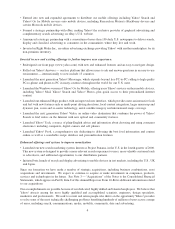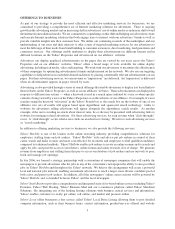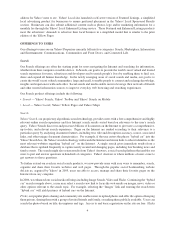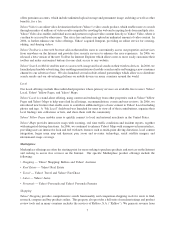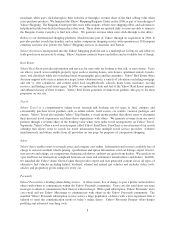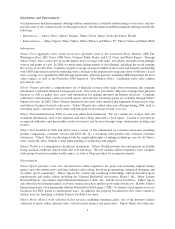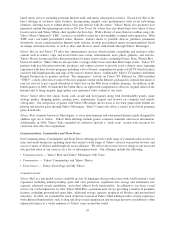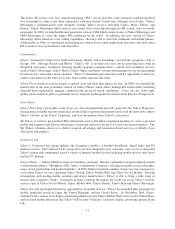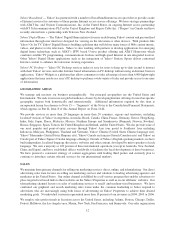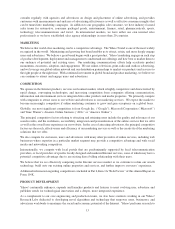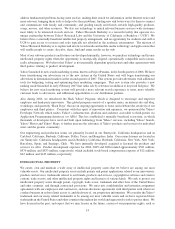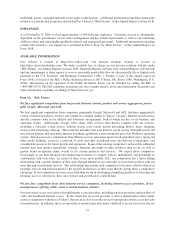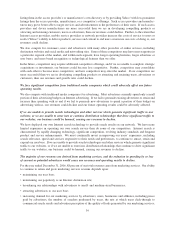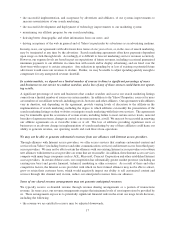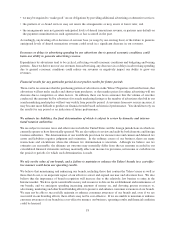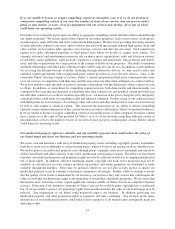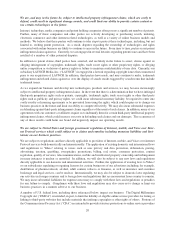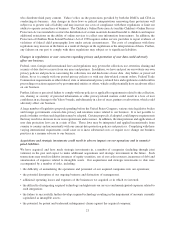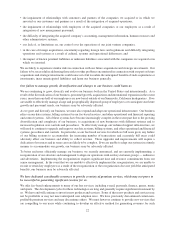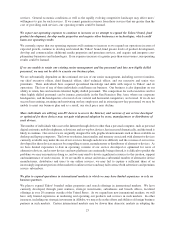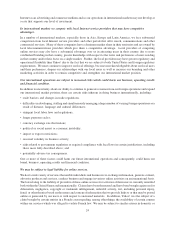Yahoo 2006 Annual Report Download - page 24
Download and view the complete annual report
Please find page 24 of the 2006 Yahoo annual report below. You can navigate through the pages in the report by either clicking on the pages listed below, or by using the keyword search tool below to find specific information within the annual report.address fundamental problems facing users such as: making their search for information on the Internet easier and
more relevant; bringing them tools to help solve their problems; finding new and better ways for them to connect
and communicate with family and community; and guiding family and friends towards high-quality products,
songs, movies, and other resources. We also use technology to match relevant business services with customers
most likely to be interested in such services. Yahoo! Research Berkeley is a research facility that operates in a
unique partnership between Yahoo! Research Labs and the University of California at Berkeley (“UCB”). We
believe this is a mutually beneficial intellectual property arrangement, and an opportunity for students and staff at
UCB to gain access to resource and scale typically not afforded in the academic environment. The mission of
Yahoo! Research Berkeley is to explore and invent social media and mobile media technology and applications that
will enable people to create, describe, share, find and remix media on the web.
Most of our software products and features are developed internally; however, we purchase technology and license
intellectual property rights when the opportunity is strategically aligned, operationally compatible and econom-
ically advantageous. We believe that Yahoo! is not materially dependent upon licenses and other agreements with
third parties relating to product development.
Yahoo! launched its new search marketing system, known as Project Panama, in the fourth quarter of 2006. We have
been transitioning our advertisers on to the new system in the United States and will begin transitioning our
advertisers in international markets in the second quarter of 2007. This system provides advertisers with additional
tools for budgeting, testing and optimizing their marketing campaigns. This new system also provides a new
ranking model launched in early February 2007 that ranks ads by relevance in addition to keyword bid price. We
believe the new search marketing system will provide a more relevant search experience to users, more valuable
customer leads to advertisers, and additional opportunities to our distribution partners.
Also during 2006, we introduced the Hack Yahoo! Program, which is designed to encourage and empower
employee and third-party innovation. This global program consists of a speaker series, an intranet site and blog,
workshops, and quarterly “Hack Days” that are an ongoing opportunity to foster and celebrate the creativity of our
employees and third parties. Consistent with this spirit of innovation and openness, we sponsored the Yahoo!
Developer Network which makes Yahoo!’s infrastructure, platform and audience accessible to third-parties via
Application Programming Interfaces (or APIs.) This has established a mutually beneficial ecosystem, in which
thousands of developers have used and built upon technology from Yahoo! services, including Yahoo! Search,
Yahoo! Photos and Yahoo! Maps, to further increase the relevance of Yahoo! products and services for individual
users and the greater community.
Our engineering and production teams are primarily located in our Sunnyvale, California headquarters and in
Carlsbad, California; Burbank, California; Dallas, Texas; and Bangalore, India. Our research teams are located in
our Sunnyvale, California headquarters and in Berkeley, California; Burbank, California; New York, New York;
Barcelona, Spain; and Santiago, Chile. We have internally developed, acquired or licensed the products and
services we offer. Product development expenses for 2004, 2005 and 2006 totaled approximately $381 million,
$570 million, and $833 million, respectively, which included stock-based compensation expense of $12 million,
$22 million and $145 million, respectively.
INTELLECTUAL PROPERTY
We create, own and maintain a wide array of intellectual property assets that we believe are among our most
valuable assets. Our intellectual property assets include patents and patent applications related to our innovations,
products and services; trademarks related to our brands, products and services; copyrights in software and creative
content; trade secrets; and other intellectual property rights and licenses of various kinds. We seek to protect our
intellectual property assets through patent, copyright, trade secret, trademark and other laws of the United States
and other countries, and through contractual provisions. We enter into confidentiality and invention assignment
agreements with our employees and contractors, and non-disclosure agreements with third parties with whom we
conduct business in order to limit access to, and disclosure of, our proprietary information. We consider the Yahoo!
trademark and our many related trademarks to be among our most valuable assets and we have registered these
trademarks in the United States and other countries throughout the world and aggressively seek to protect them. We
have licensed in the past, and expect that we may license in the future, certain of our proprietary rights, such as
14


